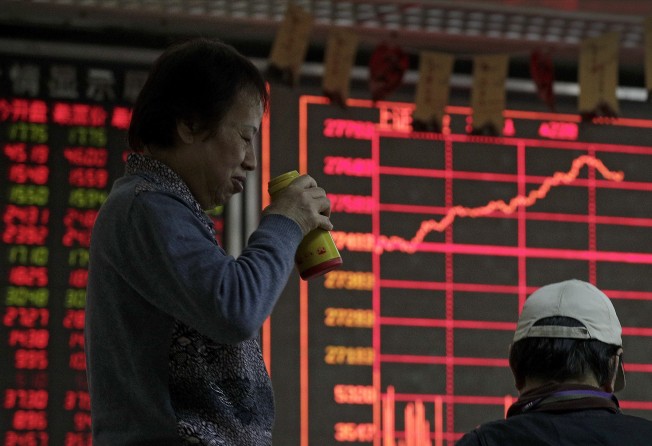China’s stocks drop most in week as trade talk optimism gives way to deflation concern
- China’s producer prices increased the least in more than two years in December, fanning jitters about deflation in industrial products
- China says trade meetings were ‘extensive, in-depth and detailed’ – but investors still looking for resolution

Mainland China’s stocks fell by the most in a week as deflationary pressure on factory prices stoked concerns about the strength of the world’s second-largest economy, tempering optimism about progress on trade talks. Hong Kong stocks rose slightly.
The Shanghai Composite Index dropped 0.4 per cent, or 9.25 points, to 2,535.10 in a choppy session on Thursday. The Hang Seng Index added 0.2 per cent, or 59.11 points, to 26,521.43, while the Hang Seng China Enterprises Index gained 0.4 per cent.
Stocks in the mainland swung between gains and losses for most of the day before selling dominated the final hour of trading, as economic fundamentals eventually gripped the attention of traders. An official report released in the morning by the statistics bureau showed producer prices rose 0.9 per cent in December, the least since late 2016. Decelerating prices weaken aggregate demand and erode industrial companies’ profits.
Signs of thawing trade tensions between China and the US, coupled with an overnight rally in US stocks on the dovish tone from the Federal Reserve, failed to provide reprieve to Chinese equities.
With Beijing and Washington concluding a three-day talk, the US noted a commitment from Beijing to buy more American agricultural goods, energy and manufactured products, while China said the meetings were “extensive, in-depth and detailed”, and laid the groundwork for a resolution. The US-China trade truce ends on March 1.
“With the buzz around the trade talks probably settling down, the market focus is now back to the economic fundamentals,” said Wei Wei, a trader at Huaxi Securities in Shanghai. “Investors are disappointed to find that the economy hasn’t bottomed out yet, so they don’t have confidence on the market.”
Brokerages led the pack of decliners among the mainland’s stocks on Thursday after China Merchants Securities said in a report that profits for the 20 listed securities firms dropped 26 per cent from a year earlier in 2018.
Founder Securities tumbled 6.6 per cent to 6.91 yuan and Sealand Securities slid 6.5 per cent to 5.17 yuan. Southwest Securities sank 5.8 per cent to 4.05 yuan.
Citic Securities was the only exception, with the shares rising 4.9 per cent to 16.80 yuan after being suspended over the past two weeks. China’s largest brokerage said it completed a 13 billion yuan (US$1.9 billion) purchase of smaller rival Guangzhou Securities, its latest in a series of acquisitions. Its Hong Kong traded-stock advanced 2 per cent to HK$14.62.
In Hong Kong, Xiaomi shed 3.6 per cent to HK$9.97, capping a three-day, 17 per cent loss and falling to its lowest level since its listing in July. The six-month lock-up period of more than 3 billion shares expired on Wednesday, paving the way for sell-offs from its pre-initial public offering investors.
I-Cable Communications sank 2.6 per cent to 11.3 Hong Kong cents after independent shareholders rejected the rights issue plan by the operator of pay TV.
Renewable energy stocks surged on the mainland and Hong Kong after China said it will start building solar power and wind projects in pilot programmes that will not be subsidised by the government. Power prices from these projects will be the same or lower than from coal-fired plants and long-term power purchase contracts with grids at fixed tariff will be encouraged, the National Development & Reform Commission said in a statement.
Solar panel component maker Longi Green Energy Technology jumped by the 10 per cent daily limit to 20.93 yuan in Shanghai and Sungrow Power Supply, a maker of photovoltaic inverters, rallied 7.4 per cent to 9.55 yuan in Shenzhen. Xinjiang Goldwind Science & Technology added 5.5 per cent to HK$7.11 in Hong Kong and wind farm operator China Longyuan Power Group gained 3.3 per cent to HK$5.58.